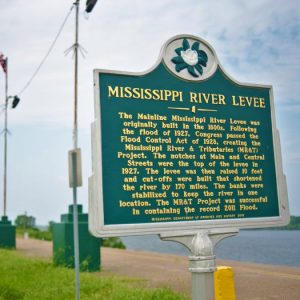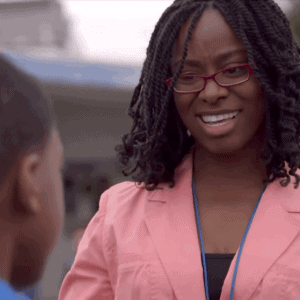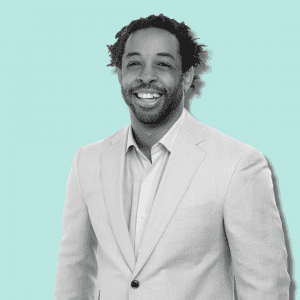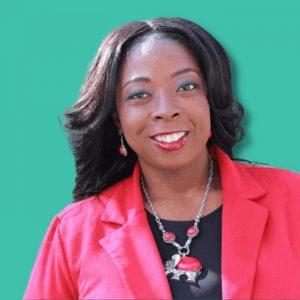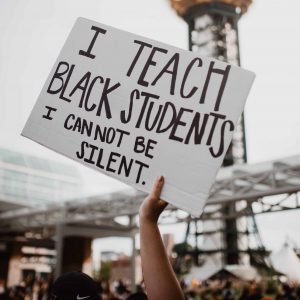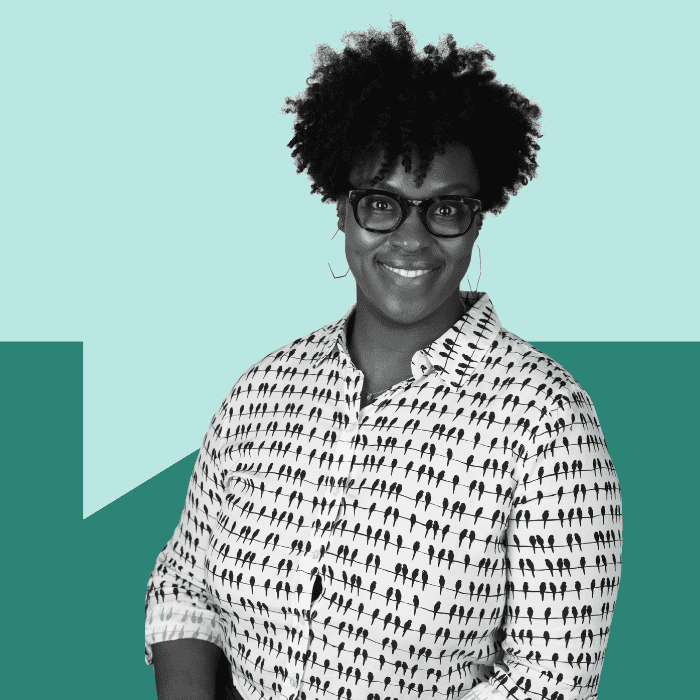
Beyond Black History Month: Celebrating Black Experiences Everyday
03/11/2022

LeAnita Garner describes herself in a few ways: learner, caring big sister, mother, wife, daughter of an educator, and a career educator herself. These facets are shaped and enhanced by the power she finds in her heritage.
Within the context of Black History Month, she hopes we can start to change the way we celebrate and center Black stories beyond February. Here, we share glimpses of LeAnita’s journey in education and her hopes for all young people, as told to Marques Celestine, Managing Director of Talent at Leading Educators.
Early experiences with education
Marques Celestine: My daughter’s school holds morning meetings every day. As part of a recent Black History Month celebration, they had all these kids come up and say their own “I Have a Dream” into the microphone–all the things that they envision for this country. I was struck by these really beautiful reflections about peace, about respect, about fair treatment.
At the same time, these are the kinds of statements we should be making on a day-to-day basis, you know? Why does it have to be framed one way for us to have this realization? We don’t benefit from the history and legacy of Black people once a month, once per year. Every second of every day, that legacy exists. Being in the South, I drive up and down these esplanades with these multimillion-dollar mansions, and the legacy of our people is embedded in the foundations of those buildings.
You’ve had all these entry points into education and seen the way that systems work on different levels. What’s a memory you have from early on that influenced your perception of education?
LeAnita Garner: My brother is four years younger than me. Obviously, we grew up in the same house, with the same parents, and went to the same elementary school. I went to school during a time when tracking was the thing. You were tested, and you were placed into a certain lane based on your test scores.
I was on this track where it felt like everything was offered to me. We had field trips. We had computer programs, a dual-language program, and even access to different ways of expressing ourselves when it came time to turn in a book report. I could sing a song about it if I wanted. Learning was shaped in a way that didn’t feel like what I expected school to be because it was so free and collaborative.
My brother was there four years later but on a different track. In maybe sixth grade for me, he’s just two doors down the hall, and it is pure chaos. Pure chaos.
He gets in trouble every day. There’s yelling. You can literally hear the yelling from the classroom while we’re dancing, rapping, singing, and learning poems by African American artists. I didn’t understand this stark difference. I was asking, what can I do? How do we–how do I–support my brother and get him the same type of experience? My value for education came from what it afforded me.
My mom was also an educator. So, growing up, I saw how she would interact with us and how my brother would react to her. It was very different. The point I’m trying to make is that when you have an opportunity afforded to you, then you value that opportunity. For me, that’s what education was: there was this space where I could learn about whatever I wanted to learn. And I could constantly grow, learn more, and do different things. It was sort of like this window into everything that was outside of my home. I wanted everybody to experience it the way that I experienced it.
MC: That’s so interesting. I experienced a very similar tracking system. Even within our own social groups and whatnot, there were certain perceptions that you would make. You would assign degrees of intelligence, all these things, according to where you were placed and how you were positioned.
Translating that into a desire to make sure that everyone has a positive experience versus perpetuating a system that clearly is designed to leave certain people out is a very powerful and noble thing.
As you think about that and the elements of your identity that influenced how you experienced life as a student, how did they inform the work that you did as an educator and in later roles?
LG: I worked in schools where the majority of my students were also Black, so I wanted to be able to present myself in a way that lifted them up. I wanted them to look at me, see me in a position, and say, “This is a good thing. This is something that I could aspire to be.” I wanted to show up as someone who was proud of that part of my identity. I wanted to be someone who showed up for students and believed in their potential despite the messages that were shared about my identity.
Early in my career, the sister part of my identity really showed up a lot because of the story I shared about my brother. I have two brothers, and I’m the oldest sibling. So, I was always caring for them, always trying to make sure that they had everything that they needed.
I carried a little piece of that into my classroom. I wanted to make sure that my students felt comfortable. During the day, I’m Ms. Randolph, and we’re learning. But if you invite me to your birthday party, I’m going to show up, and I’m going to be the extra friend that you need. Or if you want to talk to me about the trip you took to the park and this thing that you did that was really scary, I want to be that friend who sits next to you and hears it.
I wanted to be kind of like that big sister who can say, “I’m here for you. I see you. Tell me all the things, and I’m going to do my best to protect you. I’m going to do my best to serve you in this role.”
where we go from here
MC: That care shows up in you, and it’s something we need now. We exist in a political climate that is challenging at best. We are still trying to claw our way out of a pandemic. And there are challenges that have always existed, primarily in urban schools. The convergence of all of these factors is exacerbating some of the challenges that we’ve historically had.
When you think of where we are, where we’ve been, and where we should be, what is your hope?
LG: Right away, I think about limitless potential. I’ve been in so many conversations with teachers, teacher leaders, and school leaders, and because of the repercussions of this pandemic, there’s so much language about loss. Students are so low, they can’t even…and it’s disheartening.
I truly want Black students to enter a school building or a classroom and be seen for their limitless potential, despite what their academic numbers say, despite what their behavior might show at times. I want them to be seen as somebody who can, somebody who will, and somebody who deserves.
It’s really hard to hear those negative messages over and over. Consider what that means and how a student might internalize it.
I also just want kids to experience the opportunity to learn about something at a higher level. Today, I was in a school, and we were talking about texts. A teacher said, “Well, my students can read that text. They don’t know anything about this little girl from Ethiopia.” And I said, “That’s exactly why they should read it. That’s exactly why you should read it with them—because they don’t know. It’s not their fault.” If we change the way we think about what students can handle, then I think we can shift what they can do. If this book gave me the opportunity to learn about something I didn’t know about before, why would I take that away from my kids?
MC: That’s awesome. You just gave me an example of the kind of conversations you’re having every day.
What difference do you see Leading Educators making?
LG: People are beginning to rethink their beliefs about what students can do, who students are, and what they bring to the table. They’re beginning to think about how behaviors that they’ve displayed or practices that they’ve had for years have not shown students that they can do anything, that they have limitless potential. That, yes, systems are unfair, but practice can also exacerbate the issues.
So, if I’m in their shoes and doing something in a way that continues with the status quo, why would I ever see change?
I think Leading Educators opens the door to having that hard conversation. We help people have it with themselves, within the context of schools, and with each other, and really start to interrogate some of the beliefs and practices that we traditionally thought were working.
Reflecting on Why
MC: You talked about your identity as a mother, a sister, a black woman, and, of course, an educator.
Wearing all those hats, what’s the impact that you want to make? Why do you stay in?
LG: At the end of the day, I want to be remembered as someone who cared deeply and who worked tirelessly in whatever capacity, whether it’s in the role of the teacher and the role of the coach or now in the role of someone who designs and delivers professional learning. I want to be someone who cares deeply and works tirelessly to achieve the things that I said. I want students to get this positive experience. I want students to be seen in their classrooms for who they are. I want them to have opportunities given to them because they deserve them. So, I want to be remembered as an advocate for that.
MC: As a father, I have enjoyed the opportunities during Black History Month to go to my daughter’s school and hear the kids productively discuss all the contributions of Black people in this country. In a very, very small way, those students are seeing themselves and the importance of their personal histories. On the other hand, I’m a little conflicted, because our contributions don’t always get to be our own. For example, when “America” goes to the Olympics and a Black athlete wins the gold medal, “we” win. When the New Orleans Saints won the Super Bowl, “we” won. But when we talk about the legacy of Black people in this country, “It’s they did this, y’all did this, these people did that.” It’s not a shared collective, “This is America. This is our legacy as a country.”
I think as long as we continue to see the accomplishments of a core element of this country’s society as still separate and distinct, it holds us back. You alluded to this. We don’t get to be Black in February and then discard our Blackness on March 1. You carry it with you.
How can we, as a country, as contributors to this educational practice across systems and as individuals, continue to center the stories of Black people so that our students continue to see themselves in the greatness of what we do and who we are?
LG: It’s not simple, but I think sharing those perspectives is a place to start. Who’s telling your story? I think the way Black History Month is positioned means that, most often, somebody else is telling our story. So, in order for the story to be centered, we have to shift that perspective. And we have to tell our own story. And it doesn’t just happen in February. It happens every day.
There might need to be a power shift as well. I feel like there are people within our community who are using the platform that they have to tell our story in our own words, from our perspective, and so it’s a matter of highlighting those individuals in March, sharing those individuals in April, and lifting up a different version of the story so that people can see it’s not just Black history. Black history is a part of American history.



